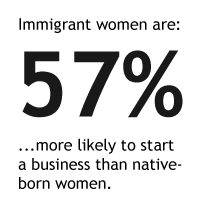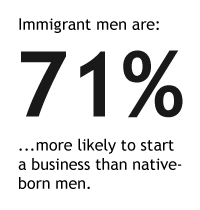ECONOMICS AND TRADE | Achieving growth through open markets
07 March 2008
Immigrants Fuel Small Business Growth in the United States
Rates for startups are higher for immigrants than for native-borns

Washington -- Immigrants are one of the fastest-growing segments of small business owners in the United States and will be a sizeable portion of owners by 2017, according to Intuit Inc.'s Future of Small Business Report, co-authored by the Institute for the Future.
Men and women among the 36 million immigrants in the United States have higher rates of starting new businesses than do native-born Americans, says Robert Fairlie, an economist who produces the Kauffman Index of Entrepreneurial Activity. The index shows that immigrant women are starting businesses at a rate 57 percent higher than native-born women. And immigrant men start businesses at a rate 71 percent higher than native-born men.
Peter Liu, the founder of San Francisco's New Resource Bank in San Francisco, is a native of Taiwan. After earning degrees at University of California, Berkeley, Liu says he looked for a job with the "biggest company that would pay the most." But after he landed such a job, designing petrochemical plants around the world, he became disillusioned. He noticed that the best and cleanest technology was not always used.
In 2006, Liu opened New Resource, which seeks to support green design "through the economy." Today, the bank has more than $130 million in assets and has attracted business customers interested in sustainable energy from around the globe (and even a $10 million deposit from the state of California).
According to Institute for the Future's Steven King, because immigrants can easily navigate "soft trade-barriers" -- culture, language, unusual rules or ways of doing things overseas -- they increase trade and foreign investment in the United States.
Immigrants start businesses for a variety of reasons, often to avoid barriers that come with traditional jobs or because their skills do not translate well into corporate America. Because small businesses employ slightly more than half of all U.S. private-sector workers, these immigrants are staking their place in the economy as job creators.
Asa Kalavade, raised in India, co-founded Tatara Systems Inc., a Massachusetts-based technology business that employs 65 people. Kalavade said in India she felt societal pressure to study something more "woman-friendly" than engineering. After earning a graduate engineering degree at University of California, Berkeley, she stayed in the United States to work at Bell Labs Research before setting off on her own.
Starting her own business was not easy. Kalavade estimates that from 1999 through 2001 some 40 venture capitalists turned her down when asked if they would exchange startup money for equity in the company.

She and her co-founder, a woman from China, did not give up, and, eventually, investors helped them start Tatara. Fairlie would say Kalavade is daring by nature. "To leave your own country and come at great cost to another country, that's self-selecting" for entrepreneurial spirit, he said.
Immigrants are "prone to taking risks," said Farhana Huq, of CEO Women, a San Francisco nonprofit that helps low-income immigrant women start businesses. "They really just put themselves on the line."
According to the Institute for the Future's Steven King, "mompreneurs," entrepreneurs who are also mothers, get work-life balance by being their own bosses. And immigrant women are no exception.
Fanta Nabay left Sierra Leone and came to the United States in 2000 after rebels killed her parents in front of her and her siblings. Nabay started a retail business through which she sells hand-dyed African cloth and handmade jewelry in California. When she and her husband had a baby, her focus shifted to the baby, so she started a daycare center.
Immigrants have advantages in a global marketplace, the Intuit study says; language skills and relationships from home countries help them find suppliers and customers. America.gov contacted Kalavade in India, where she was on a business trip. When America.gov telephoned Nabay, she was on another call to Africa.
Yan Liu came to the United States in 1997 after graduating from college in China and running her father's retail business in Shandong for two years. In 2002, she opened a jewelry store (Lireille) in Oakland, California. Her father locates gemstones and jade in China for her.
"In China, each region specializes in different products. Even within a city there are different districts specializing. You have to know those places. That's one of our advantages," Yan Liu said.
Even though only two out of 10 of all small businesses succeed in their first year, immigrants might have an advantage, according to King. "Immigrants are more attuned -– often more than natives -– to the opportunity in America," he said. These motivating factors lead to a higher rate of success."
Yan Liu said, "I'm still starting, not successful yet, but I am happy with myself."
The full text of the Future of Small Business Report is available on Intuit's Web site. The Kauffman Index of Entrepreneurial Activity is available on the Kauffman Foundation's Web site.
For information about how to determine the needs for financing a new business, see “The Entrepreneur's Need for Capital,” from the Bureau of International Information Programs publication Principles of Entrepreneurship.
